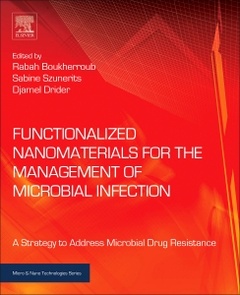Description
Functionalized Nanomaterials for the Management of Microbial Infection
A Strategy to Address Microbial Drug Resistance
Micro and Nano Technologies Series
Coordinators: Boukherroub Rabah, Szunerits Sabine, Drider Djamel
Language: English
Subject for Functionalized Nanomaterials for the Management of...:
Keywords
Nanotechnology; Nanotubes; Carbon; Compounds; CNT-based plastics
338 p. · 19x23.3 cm · Hardback
Description
/li>Contents
/li>Readership
/li>Biography
/li>Comment
/li>
Functionalized Nanomaterials for the Management of Microbial Infection: A Strategy to Address Microbial Drug Resistance introduces the reader to the newly developing use of nanotechnology to combat microbial drug resistance. Excessive use of antibiotics and antimicrobial agents has produced an inexorable rise in antibiotic resistance in bacterial pathogens.
The use of nanotechnology is currently the most promising strategy to overcome microbial drug resistance. This book shows how, due to their small size, nanoparticles can surmount existing drug resistance mechanisms, including decreased uptake and increased efflux of the drug from the microbial cell, biofilm formation, and intracellular bacteria. In particular, chapters cover the use of nanoparticles to raise intracellular antimicrobial levels, thus directly targeting sites of infection and packaging multiple antimicrobial agents onto a single nanoparticle.
1. Resistance to Antibiotics and Antimicrobial Peptides: A Need of Novel Technology to Tackle This Phenomenon 2. The Role of the Food Chain in the Spread of Antimicrobial Resistance (AMR) 3. Penetrating the Bacterial Biofilm: Challenges for Antimicrobial Treatment 4. Metal Nanoparticles for Microbial Infection 5. Lipid-Based Nanopharmaceuticals in Antimicrobial Therapy 6. Organic Polymeric Nanomaterials as Advanced Tools in the Fight Against Antibiotic-Resistant Infections 7. Bacteriocins and Nanotechnology 8. Graphene-Microbial Interactions
Researchers and professional scientists focusing on the application of nanomaterials in pharmaceuticals, food science, environmental science and infectious diseases.
Sabine Szunerits is since 2009 Professor in Chemistry at the University Lille 1, France and was nominated 2011 as member of the “Institut universitaire de France (IUF). Her current research interests are in the area of material science with emphasis on the development of novel analytical platforms and interfaces for the study of affinity binding events and in the modification of nanostructures (diamond particles, magnetic particles, nanographene) for biomedical applications. She is co-author of more than 230 research publications, wrote several book chapters and has 6 patents
Djamel Drider is full professor of Microbiology at Lille 1 University Sciences and Technologies. D. Drider obtained his PhD from Montpellier School of Agriculture and completed his postdoctoral training at Centro de Investigaciones Biologicas (Madrid, Spain) and Mount Sinai School of Medicine of New York University (USA). D. Drider was hired as Associate Professor at Nantes-Atlantic College of Veterinary Medicine; Food Science and Engineering (France). His research is mainly dedicated to antimicrobial peptides mainly those produced by lactic acid bacteria (bacteriocins).
- Provides the information users need to integrate antibacterial nanoparticles into future treatments
- Gives readers with backgrounds in nanotechnology, chemistry, and materials science an understanding of the main issues concerning microbial drug resistance and its challenges
- Includes real-life case studies that illustrates how functionalized nanomaterials are used to manage microbial infection




